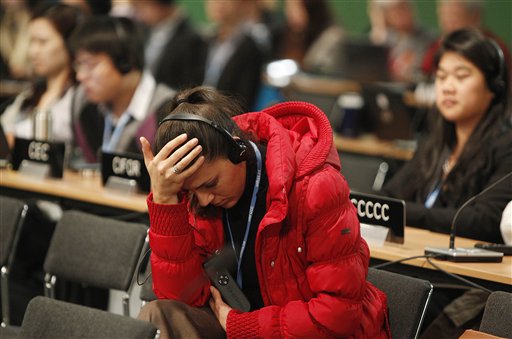(AP) UN climate talks on ‘brink of collapse’
By KARL RITTER
Associated Press
WARSAW, Poland
U.N. climate talks were deadlocked Saturday as the U.S. and China clashed over what role the Chinese and other fast-growing economies should play in a new pact to fight global warming.
Disputes over climate aid for poor countries also overshadowed the Warsaw conference as it stretched a full day beyond its scheduled end time.
The two-week talks were supposed to lay the foundation for a 2015 climate deal in Paris that countries have agreed should apply to them all. But after all-night talks, delegates struggled to agree on draft decisions outlining the way forward.
In discussions over future commitments to rein in carbon emissions, China and India insisted on wording that would keep a firewall between rich and poor countries that the U.S. and other developed countries want to get rid of.
U.S. climate envoy Todd Stern wondered whether that meant that China was no longer ready to put forth commitments for the new deal.
The plenary was suspended to give delegates a chance to work on new texts.
The U.N. climate talks were launched in 1992 after scientists warned that humans were warming the planet by pumping CO2 and other heat-trapping gases into the atmosphere, primarily through the burning of fossil fuels.
Countries made progress Friday on advancing a program to reduce deforestation in developing countries, an important source of emissions because trees absorb carbon dioxide.
Climate financing proved harder to agree on. Rich countries have promised to help developing nations make their economies greener and to adapt to rising sea levels, desertification and other climate impacts.
They have provided billions of dollars in climate financing in recent years, but have resisted calls to put down firm commitments on how they’re going to fulfill a pledge to scale up annual contributions to $100 billion by 2020.
Pointing to the devastating impact of Typhoon Haiyan in the Philippines, island nations also demanded a new “loss and damage mechanism” to help them deal with weather disasters made worse by climate change. Rich countries were seeking a compromise that would not make them liable for damage caused by extreme weather events.
___
Associated Press writer Monika Scislowska contributed to this report.
___
Karl Ritter can be reached at https://twitter.com/Karl_Ritter

COMMENTS
Please let us know if you're having issues with commenting.